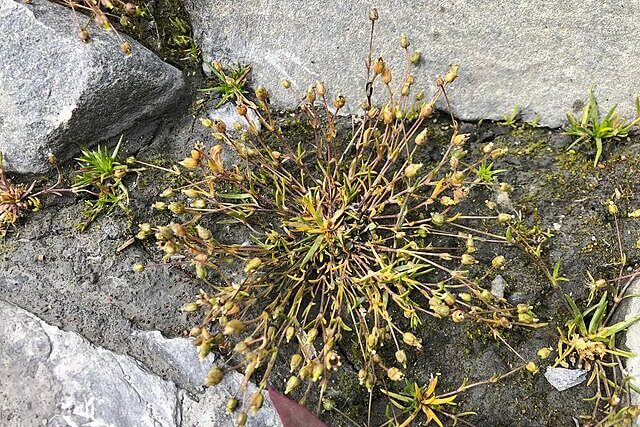
Scotland’s unique arctic-alpine plant species, thriving on its mountainous terrain, are experiencing a concerning decline, inching toward extinction. The Stirling University study reveals that these plants, including the snow pearlwort, alpine lady-fern, and alpine speedwell, are retreating to higher elevations on the mountains due to climate change.
Among them, the snow pearlwort exemplifies the crisis. Ben Lawers in Perthshire holds almost the entire British population of this plant, yet two-thirds of these colonies have vanished in the last four decades. Similarly, drooping saxifrage is now restricted to just 50 meters from the mountaintop.
The encroaching threat emerges from warmth-seeking species that traditionally inhabit lower altitudes but are progressively colonizing higher slopes due to rising temperatures. These mountain plants depend on open, gravelly habitats that rely on spring and early summer snow cover, which is dwindling rapidly.
The loss of this protective snow cover induces freeze-thaw cycles that trigger landslides and rockfalls, destabilising the plants’ habitat. This phenomenon of climate-induced migration could lead these native mountain species to run out of higher ground, eventually culminating in their extinction.
Sarah Watts, a PhD researcher from the University of Stirling’s Faculty of Natural Sciences, alongside National Trust for Scotland (NTS) staff and volunteers, dedicated 12 years to monitoring these 10 rare species on Ben Lawers, augmenting a 40-year dataset.
Miss Watts said: “Our research signals a rapid loss of biodiversity happening right now which means that, if it’s allowed to continue on this accelerated trajectory, due to climate change, we will see the extinction of species like these.
“What we are seeing here is range contraction – where species that grow in cold places, in the north and at high altitude, are moving further north and higher up the mountain. But at some point, they’ll have no further to go and will disappear. For example, drooping saxifrage is now only found 50 metres from the top of Ben Lawers.”
Professor Alistair Jump, Dean of the Faculty of Natural Sciences and Head of the Global Change Ecology Research Group at the University of Stirling, said: “In the context of the interacting climate change and biodiversity crises, this research has worrying global implications. It shows that low-latitude arctic-alpine plant populations already situated at maximum local elevations are effectively on the elevator to extinction: we face their loss from our mountains because there is no higher ground left for them to retreat to as temperatures continue to rise.
“The declining mountain flora we have studied functions as a canary in the coal mine for escalating climate change and indicates broader threats to biodiversity in the coming decades.”
At 1,214 metres, Ben Lawers is the 10th highest peak in Britain and is rich in alkaline soils, making it a haven for rare plants.
Miss Watts said: “Ben Lawers is the most southerly site in Europe where snow pearlwort grows, and the only one in Britain. Elsewhere, it’s found in the Arctic and in northern Scandinavia, in places like Svalbard.
“Mountain outpost sites such as Ben Lawers, at the edge of the global range of arctic-alpine plants, are unique biodiversity hotspots. These plants have high cultural and inspirational value, and may have unique genetic variations which will be lost forever when they go.”
However, she did say how the species could be preserved.
“Development of ex-situ plant conservation collections of these threatened species, in collaboration with expert horticulturalists working at botanical gardens, will be of critical importance for preserving the Scottish Highland populations before they become extinct in the wild.
“These collections would also allow us to conduct further research into the factors affecting the plants’ survival or decline, and could be used for translocations and assisted migrations to more suitable mountain habitat in the future.”
——————————————————————————
At Natural World Fund, we are passionate about stopping the decline in our wildlife.
The decline in our wildlife is shocking and frightening. Without much more support, many of the animals we know and love will continue in their decline towards extinction.
When you help to restore a patch of degraded land through rewilding to forests, meadows, or wetlands, you have a massive impact on the biodiversity at a local level. You give animals a home and food that they otherwise would not have had, and it has a positive snowball effect on the food chain.
We are convinced that this is much better for the UK than growing lots of fast-growing coniferous trees, solely to remove carbon, that don’t actually help our animals to thrive.
This is why we stand for restoring nature in the UK through responsible rewilding. For us, it is the right thing to do. Let’s do what’s right for nature!
Donate today at https://naturalworldfund.com/ and join in the solution!

